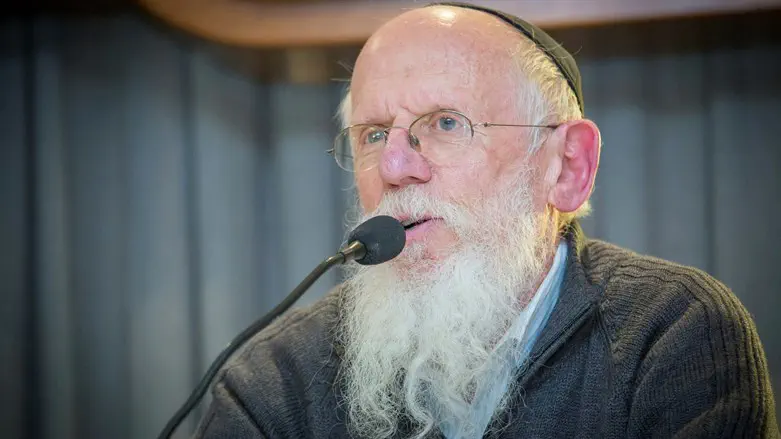
The dean of the Har Etzion yeshiva, Rabbi Yaakov Meidan, has published a paper for educators in the Religious-Zionist system regarding the LGBT issue.
Rabbi Meidan emphasized that he was publicizing his stance as a private individual and not as the dean of his yeshiva. He also noted that he had formulated his position after receiving requests from a number of educators at Religious-Zionist institutions.
Regarding the correct way to behave toward people with homosexual tendencies, Rabbi Meidan wrote: "A person who has homosexual tendencies and who refrains from performing immoral deeds that may stem from those tendencies is a normal person, 'one of us,' a person with wisdom, feelings, and sensitivities, who is capable of attainments in every area including learning Torah and acquiring fear of Heaven.
"One must preserve these people's respect and behave toward them with sensitivity, according to the mitzvah of 'Ve'ahavta le'reiecha kamocha--And you shall love your neighbor as yourself,'" Rabbi Meidan continued. "Furthermore, I am inclined to say that these days, we are obligated to accord them the extra sensitivity we must accord converts as they are 'not like everyone,' and perhaps must also take care not to cause them any pain, as is the law with regard to widows and orphans. We must remember that just as we are commanded to distance ourselves from any form of immorality or the similar, we are also commanded not to shed blood or to do anything that could lead to that, and I think you can grasp my intention."
Nonetheless, regarding the LGBT flag, Rabbi Meidan was critical. "This pride flag is an open declaration of opposition to the Torah and of support for certain deeds that are forbidden and categorized as Canaanite abominations, and committing such deeds provides a reason for G-d to expel us from the Holy Land, chalilah."
On the actual deed itself, Rabbi Meidan wrote, "Our obligation to live according to the Torah is unconditional and is more important than understanding the Torah or identifying with the commandments. [This deed] is one of the most severe prohibitions in the Torah and everyone must refrain from it in every circumstance, even if it entails giving up one's life."
According to Rabbi Meidan, "Someone who does commit this deed is to be regarded as a sinner in these aspects, and certainly this is the case if he advertises the fact that he behaves in this manner, whether for ideological reasons or in order to anger others. Even worse are those who attempt to persuade others to follow in their path, especially if they target the young. Nonetheless, due to the controversy in the public sphere in these matters, one must proceed with great forethought and wisdom, and take advice from those with experience in dealing with such matters."
On the question of conversion treatments, the rabbi noted that, "Many of those who regard themselves as homosexuals, and mainly bisexuals, are on a continuum. They are also attracted to women, even if their feelings are repressed, and experts must be consulted in order to determine if treatment could be successful and would enable the person to enter into a loving relationship with a woman and to establish a family - as long as these experts do not have an ideological agenda."
According to Rabbi Meidan, "The Israeli government has for the moment banned this treatment, but this was a political decision due to a certain agenda, and there are many cases in which treatment has been successful and the people concerned have gone on to establish families. Those politicians who argue that they want to avert the dangers of the treatment are contradicting themselves when it comes to the far greater dangers inherent in the transgender operations they permit. Furthermore, this population has a much higher suicide rate, seven times worse than could be caused by a psychological program.
"The media actively seeks to stop people with unwanted homosexual tendencies from finding help," Rabbi Meidan added. "They view people who warn against this grave sin as enemies of humanity no less. But we must not be silenced. Today, there is a battle over the terminology, seen especially with those who argue that the words 'father' and 'mother' must not be used, as they are 'repressive' and should be replaced by 'parent 1' and 'parent 2.' But the words 'father' and 'mother' are statements of ethical values and we must not resign ourselves to being barred from using them. The language we use influences us greatly, and if things continue in this way, an anti-Torah consciousness is likely to be formed in those who use such terminology."
